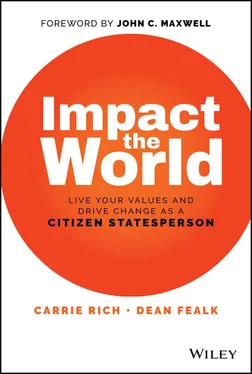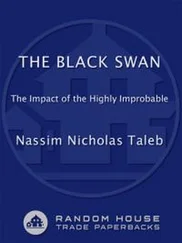These concerns are deeply felt. According to a 2019 Pew Research survey, 1 most Americans expect income gaps to widen over the next three decades. Nearly half anticipate that the standard of living in the United States will get worse by 2050, while just 20 percent believe it will improve. Almost 60 percent say the condition of the environment will deteriorate. Nearly two‐thirds of Americans expect political divisions to intensify, making it even more difficult to solve problems together.
Exacerbating these challenges is the fact that, in many cases, people have lost faith in the institutions charged with supporting and guiding us towards progress. According to a series of Gallup polls in 2021, just 38 percent of Americans have “a great deal” or “a lot of” confidence in the presidency. Big business scores lower, at just 18 percent. The media fares just as poorly; only 21 percent of Americans feel confident about newspapers, and 16 percent say the same of television news. Confidence in Congress, meanwhile, sits at just 12 percent. 2 Nearly every institution of note in the United States—from our lawmaking bodies to our executive powers to our economic engines and the arbiters of our public forums—is viewed with suspicion and doubt.
These low scores translate into real‐world impacts. When people lose confidence in politics and political institutions, for example, they tend to gravitate towards behaviors and ideologies less likely to lead to cooperation and more likely to create dysfunctional systems. They might decide not to vote at all, producing an electorate unrepresentative of the community as a whole and a government that doesn't take their needs into account. They might drift towards extreme political views offering a scapegoat to blame or a place of refuge for disenchanted individuals. At the furthest end of the spectrum, they could lose faith in democracy as a whole and instead submit to authoritarian individuals or agendas. These results, in turn, breed further alienation and more dysfunctional politics.
The same kind of result is possible in other areas. A lack of confidence in the news media may prompt individuals to avoid learning about current events, or to dismiss facts, or to embrace fringe broadcasters with extreme viewpoints. Distrust of financial institutions or businesses could discourage individuals or communities from meaningfully participating in the economy, calcifying poverty, and walling off populations from economic growth. Over time, our cynicism can contribute to an age of inflamed tensions, widespread division, hypernationalism, and xenophobia—without trust in institutions, we are left with limited avenues for progress. We are regularly confronted by problems, but we don't believe our existing power structures will effectively step in to address them.
That's the bad news.
Here's the good news: even as we grapple with entrenched challenges and deteriorated institutions, we simultaneously live in an age of superpowered and super‐engaged individuals. The Internet and mobile telephony have brought once‐obscure information to our fingertips, enabling people to learn about problems and dig deep into tools for solutions. Technology lowered the barriers to entry for starting a company, supporting a cause, and spurring a social movement. Increased connectivity is making it easier for a person not only to take action in their own community, but to scale their efforts quickly and effectively—allowing good ideas to find larger audiences and create broader global impact.
The intersection of these dynamics is clear:
1 We live in a time where people have lost confidence in traditional institutions of power.
2 We live in an age of the superpowered individual committed to driving change in meaningful and multifaceted ways.
Increasingly, we struggle to engage institutions to tackle pressing challenges—but at the same time, individuals have the power like never before to step into the void. These circumstances create opportunities for the rise of citizen statespeople: individuals who are well equipped to take on and engage with the most complex issues society faces.
The citizen statesperson is not just a superpowered individual; the citizen statesperson is a superpowered individual who is committed to improving one's community and the world. Not content to sit idly on the sidelines as a mere critic of events, the citizen statesperson is an active participant in the work of the moment, and the epitome of Teddy Roosevelt's “man in the arena” who labors in the pursuit of a worthy cause:
It is not the critic who counts, not the man who points out how the strong man stumbles, or where the doer of deeds could have done them better. The credit belongs to the man who is actually in the arena, whose face is marred by dust and sweat and blood; who strives valiantly; who errs, who comes short again and again, because there is no effort without error and shortcoming; but who does actually strive to do the deeds; who knows great devotions; who spends himself in a worthy cause; who at the best knows in the end the triumph of high achievement, and who at the worst, if he fails, at least fails while daring greatly, so that his place shall never be with those cold and timid souls who neither know victory nor defeat.
Of course, not every challenge comes with dust, sweat, and blood, and not every person in the arena will share the same characteristics, but there are certain qualities that tend to mark citizen statespeople and enable them to create an effective impact. We identify 10 of those key traits:
1 Drive. Citizen statespeople are driven, both by philosophical integrity and by the desire for practical experience, to understand other perspectives firsthand. Citizen statespeople share a deep commitment to an internal moral compass; they are equally dedicated to truly understanding peoples' perspectives and struggles in order to advocate on behalf of others. A citizen statesperson wants to change the status quo, and the inertia behind it. If you want to have a positive impact, you need to generate enough kinetic force to push against institutional forces. That requires relentless drive.
2 Practicality. Citizen statespeople believe in progress, optimism, and catalyzing the change they seek. They are doers who want to effect real change in tangible ways that impact peoples' everyday lives. That means being grounded in what is possible as well as understanding the levers required to make an impact. Citizen statespeople are not ivory tower philosophers cut off from the real world around them. Instead, they are connectors and achievers who view progress as the next logical stage of development—and are committed to take the actions necessary to achieve that progress.
3 Perspective. Citizen statespeople possess a sense of scale, recognizing global contexts and local impact alike. They are capable of seeing the interconnectivity of the world around them; understanding that the universe is bigger than they are, while also recognizing that they possess the capacity to catalyze important change. A citizen statesperson understands that they cannot make change at scale all by themselves—and also recognizes their potential as a catalyst and an agent of progress.
4 Realism. Citizen statespeople are realistic about where power and influence reside, and clear‐eyed about the difficulty of creating meaningful and enduring change. By homing in on critical details and recognizing the way people, communities, institutions, and power structures operate, citizen statespeople help identify tangible steps along the road to progress. Realism helps differentiate idealists from citizen statespeople; by closely observing the world around them, citizen statespeople weave components, ideas, and communities in new and impactful ways.
Читать дальше












